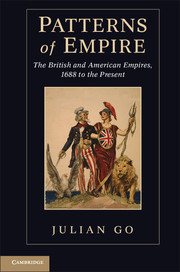Book contents
- Frontmatter
- Contents
- Preface and Acknowledgments
- List of Tables
- List of Figures
- Introduction
- 1 Imperial Paths to Power, 1688–1939
- 2 Colonial Rules
- 3 Hegemonies and Empires
- 4 Imperial Forms, Global Fields
- 5 Weary Titans
- 6 The Dynamics of Imperialism
- 7 Conclusion
- Appendix Notes on Data
- Archives and Abbreviations
- References
- Index
5 - Weary Titans
Declining Powers, New Imperialisms
Published online by Cambridge University Press: 05 June 2012
- Frontmatter
- Contents
- Preface and Acknowledgments
- List of Tables
- List of Figures
- Introduction
- 1 Imperial Paths to Power, 1688–1939
- 2 Colonial Rules
- 3 Hegemonies and Empires
- 4 Imperial Forms, Global Fields
- 5 Weary Titans
- 6 The Dynamics of Imperialism
- 7 Conclusion
- Appendix Notes on Data
- Archives and Abbreviations
- References
- Index
Summary
Rome…broke up, not from conquering too much, but from conquering too little.
– Alexander Dirom, Sketches of the State of the British Empire, 1828 (p. 72)By 2009, at least sixty-two men and women who died in Iraq while serving in the U.S. armed forces did not come from within the United States. They came from the overseas territories of the United States: thirty-six from Puerto Rico; six from the Virgin Islands; seven from Guam; five from the Northern Marianas; and eight from American Samoa. An additional forty fatalities were American Indians or Native Alaskans, and forty-eight were Native Hawaiians or Pacific Islanders. We should now know the significance of this. These numbers remind us of the tragedies of war, but they also evoke imperial continuities. They tell of connections between America's history of imperial intervention and its current imperial forays into the Middle East; of America's long-standing status as an imperial power; of resonances from the past to the present returns of empire. President George W. Bush alluded to similar continuities and imperial resonances when, in 2003, he gave a speech mentioning that “coalition forces, including Filipino peacekeepers and medical workers, are working for the rise of freedom and self-government in Iraq.” He gave that speech in Manila, on the floor of the Philippine Congress that President William H. Taft had helped establish in 1907.
Referring to these imperial continuities, however, also raises questions about discontinuities. After all, when the United States seized the Philippine Islands and other overseas territories, it was only an ascending global power; merely a “New Empire,” as Brooks Adams declared famously in 1903, positioning itself to take over the world. The more recent imperial forays into Iraq have occurred in a very different climate, a very different geopolitical context. The United States has not been a hegemon ascending but a hegemon falling. Rather than a promising new player on the world scene whose imperial expansion once matched its youthful exuberance, the United States has been an aging empire watching dreadfully as rivals threaten to take their slice of the pie. In this very different context, what does imperial expansion mean?
- Type
- Chapter
- Information
- Patterns of EmpireThe British and American Empires, 1688 to the Present, pp. 166 - 205Publisher: Cambridge University PressPrint publication year: 2011



